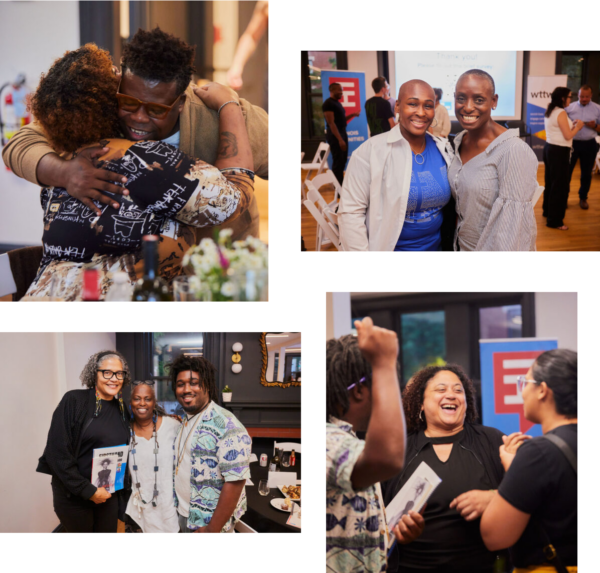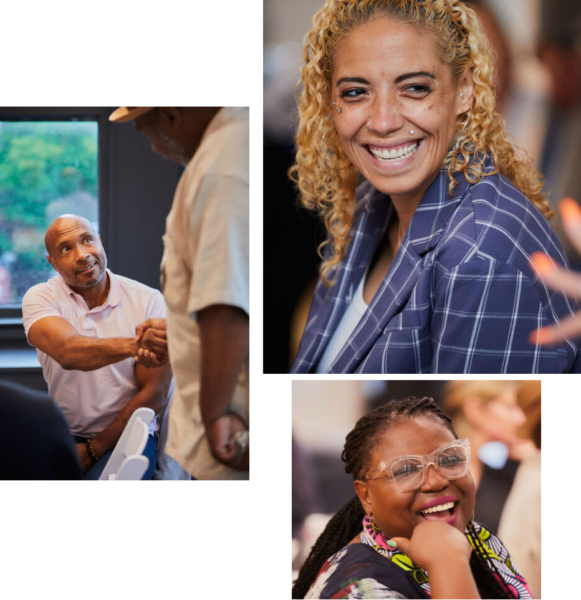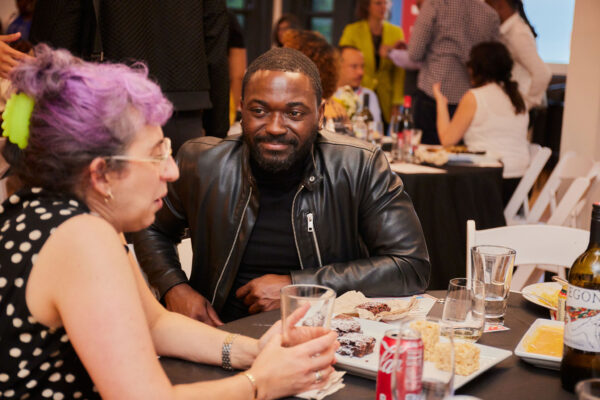On Wednesday, July 12, 2023, Illinois Humanities gathered 60 artists, humanists, policymakers, and organizers at Haymarket House in Uptown to ask: how can the humanities and the arts be tools for healing, for pursuing freedom, for building a livelihood, and for staying connected throughout incarceration and re-entry? Inside & Out: The Arts, Humanities, and Re-entry was created to illuminate the impacts and implications of returning home from incarceration – a topic deeply connected to Illinois Humanities’ Envisioning Justice program and to our partnership with WTTW’s FIRSTHAND: Life After Prison initiative, which offers an intimate look at the challenges and opportunities facing people returning to society after spending time in prison.
 But the event was as much about who we gathered and how we were gathering as why. Each person in the room that evening had something powerful and unique to contribute to the conversation, be it lived experience, a position of power, a creative practice, or deep knowledge of the criminal legal system. Among us were city officials, curators, and civil rights attorneys; poets, professors, and producers. Many among us were formerly incarcerated. Many among us have family members, friends, colleagues, and other loved ones who are behind bars today. All of us share an investment in bringing incarcerated people home to a world of abundance, healing, and possibility. We gathered around tables adorned with flowers, wine, and delicious food from our friends at Land and Sea Dept., because we know that hospitality eases anxiety and deepens connections. And those connections matter. We believe deeply in the potential inherent in cultivating relationships, collaborations, and visions around the power of the arts and humanities to resist and transcend barriers, in this case those imposed by the carceral state.
But the event was as much about who we gathered and how we were gathering as why. Each person in the room that evening had something powerful and unique to contribute to the conversation, be it lived experience, a position of power, a creative practice, or deep knowledge of the criminal legal system. Among us were city officials, curators, and civil rights attorneys; poets, professors, and producers. Many among us were formerly incarcerated. Many among us have family members, friends, colleagues, and other loved ones who are behind bars today. All of us share an investment in bringing incarcerated people home to a world of abundance, healing, and possibility. We gathered around tables adorned with flowers, wine, and delicious food from our friends at Land and Sea Dept., because we know that hospitality eases anxiety and deepens connections. And those connections matter. We believe deeply in the potential inherent in cultivating relationships, collaborations, and visions around the power of the arts and humanities to resist and transcend barriers, in this case those imposed by the carceral state.
Despite the many incredible people in the room, it weighed heavily on our minds who was not present: our friends, colleagues, family members, and loved ones still behind bars, still waiting for their chance to return home. To ensure their presence was felt, IH Community Educator Meredith Nnoka graciously shared the powerful words of Jimmie Moody, a poet she recently taught at Stateville Correctional through the Prison and Neighborhood Arts/Education Project. “I wonder, will I die in prison? / Like so many men and women who didn’t get the chance to see their / vision. / I wonder, will I see mine?” his poem begins.
Jimmie’s questions hung heavily while we watched a segment of one of the powerful documentaries from the FIRSTHAND platform, and then dove into conversation. Invited speakers Denzel Burke, Nicholas Crayton, Michael Fischer, and Faylita Hicks joined moderator Tyreece Williams, program manager for Envisioning Justice, to share their own journeys and perspectives about developing unique and potent practices as artists and humanists while resisting the dehumanizing effects of the criminal legal system.
 Faylita told us how receiving a Right of Return Fellowship when she barely had the means to survive cemented her sense of self and her expansive identity as an artist. A poet, performer, and educator, Faylita is now helping to launch The Center for Art & Advocacy, a national organization aimed at supporting formerly incarcerated artists.
Faylita told us how receiving a Right of Return Fellowship when she barely had the means to survive cemented her sense of self and her expansive identity as an artist. A poet, performer, and educator, Faylita is now helping to launch The Center for Art & Advocacy, a national organization aimed at supporting formerly incarcerated artists.
Denzel told us how, returning home at age 20, he read his winning poem at Illinois Humanities’ Gwendolyn Brooks Youth Poetry Awards in person for the first time – he’d still been locked up when he won – and was stunned to be recognized by staff and attendees, not as someone who was justice-involved, but as a talented writer and charismatic public speaker. (Denzel will be the emcee at this year’s Gwendolyn Brooks Youth Poetry Awards Ceremony on September 9.)
Although Nicholas’ creative identity was self-determined while in a segregation unit, in defiance of all the people who said he couldn’t or shouldn’t own it, he shared that “on a cellular level… you have no idea the power you can give someone” by calling them an artist or a humanist when they’re in a dehumanizing place like prison. As one of our guests put it: “The Humanities and the Arts offer a way for each of us to see ourselves with a new identity that we can claim (artist, writer, poet) whether or not outside institutions see us that way.”
And institutions often create more barriers than they realize. Michael reminded us that many formerly incarcerated people are still confronted with a need to shape-shift in the face of people and systems that carry prejudice against people with criminal records, and recalled an experience in which a colleague blithely suggested that “surely there can’t be many people ‘like that’ among us.”
But there are, of course.
According to the Firsthand: Life After Prison discussion guide:
“Each year more than half a million Americans join a population of more than 20 million formerly incarcerated individuals living in [the U.S.]. Specifically, more than 600,000 incarcerated individuals leave prison annually… In Illinois, an estimated 23,662 [people] exited state prisons in 2019, with the majority of them returning to Cook County and Chicago.”
Many of those thousands of people returning home are artists, educators, philosophers, and historians. Imagine a world in which their skills, talents, and perspectives are welcomed and nurtured, to all of our benefit. This is a world that each person we invited to break bread with us works actively to realize.
 In The Art of Gathering, author Priya Parker asserts: “When we don’t examine the deeper assumptions behind why we gather, we…forgo the possibility of creating something memorable, even transformative.” On July 12, we gathered so that we could learn from one another, build and nurture relationships, and envision a truly just future. At Illinois Humanities, we believe in the power of the public humanities and the arts to transform systems, structures, and experiences through our collective imagination and creative collaboration. And when it comes to addressing the injustices of our dehumanizing criminal legal system, we are searching for nothing short of transformation.
In The Art of Gathering, author Priya Parker asserts: “When we don’t examine the deeper assumptions behind why we gather, we…forgo the possibility of creating something memorable, even transformative.” On July 12, we gathered so that we could learn from one another, build and nurture relationships, and envision a truly just future. At Illinois Humanities, we believe in the power of the public humanities and the arts to transform systems, structures, and experiences through our collective imagination and creative collaboration. And when it comes to addressing the injustices of our dehumanizing criminal legal system, we are searching for nothing short of transformation.
After we hugged and thanked our departing guests and the room was quiet again, another question from Jimmie Moody’s poem resurfaced in my mind: “I wonder how I would feel being out of prison. It’s / been so long, would I feel like a foreigner? or / would I fit right in like the last piece to a puzzle?” It is up to us – to all of the changemakers in that warm and boisterous room at Haymarket House on July 12, 2023, and to all of us across and far beyond Illinois, to envision and pursue a world that ensures he would.
FIRSTHAND: Life After Prison is a multimedia journalism initiative that uplifts the first-hand experiences of individuals returning to life after incarceration. Visit the FIRSTHAND website to watch documentary features and read about the challenges of reentry.
All photos by GlitterGuts